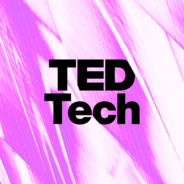Over the last decade, humanitarian organizations have digitized many of their systems, from registering refugees with biometric IDs to transporting cargo via drones. This has helped deliver aid around the world, but it's also brought new risks to the people it's meant to protect. Tech and human rights ethicist Aarathi Krishnan points to the dangers of digitization -- like sensitive data getting into the hands of the wrong people -- and lays out five ethical principles to help inform humanitarian tech innovation. After the talk, our host Sherrell shares a practical way to assess the costs and benefits of digitizing aid using Krishnan's principles.For a chance to give your own TED Talk, fill out the Idea Search Application: ted.com/ideasearch.Interested in learning more about upcoming TED events? Follow these links:TEDNext: ted.com/futureyouTEDAI Vienna: ted.com/ai-vienna Hosted on Acast. See acast.com/privacy for more information.

Wissenschaft & Technik
TED Tech Folgen
From the construction of virtual realities to the internet of things to the watches on our wrists—technology's influence is everywhere. Its role in our lives is evolving fast, and we're faced with riveting questions and tough challenges that sit at the intersection of technology and humanity. Listen in every Friday, with host, journalist Sherrell Dorsey, as TED speakers explore the way tech shapes how we think about society, science, design, business, and more.Follow Sherrell on Instagram @sherrell_dorsey and on LinkedIn @sherrelldorsey Hosted on Acast. See acast.com/privacy for more information.
Folgen von TED Tech
223 Folgen
-
Folge vom 02.09.20225 ethical principles for digitizing humanitarian aid | Aarathi Krishnan
-
Folge vom 26.08.2022A brain implant that turns your thoughts into text | Tom OxleyWhat if you could control your digital devices using just the power of thought? That's the incredible promise behind the Stentrode -- an implantable brain-computer interface that collects and wirelessly transmits information directly from the brain, without the need for open surgery. Neurotech entrepreneur Tom Oxley describes the intricacies of this breakthrough technology, which is currently enrolling participants in human trials, as well as how it could help restore dignity to those with disabilities -- and transform the future of communication. Stay tuned after the talk to hear our host Sherrell talk about the promise and potential of technology when it comes to serving one of humanity's greatest needs: connection.For a chance to give your own TED Talk, fill out the Idea Search Application: ted.com/ideasearch.Interested in learning more about upcoming TED events? Follow these links:TEDNext: ted.com/futureyouTEDAI Vienna: ted.com/ai-vienna Hosted on Acast. See acast.com/privacy for more information.
-
Folge vom 19.08.2022You shouldn't have to choose between filling your prescriptions and paying bills | Kiah WilliamsAs prescription drug costs skyrocket in the US, thousands of people are forced to forgo lifesaving medications -- all while manufacturers and health care facilities systematically destroy perfectly good, surplus pills. Kiah Williams shares how SIRUM -- a nonprofit that delivers unused medications to families who need them most -- plans to drive down prescription prices by recycling almost a billion dollars' worth of medications in the next five years. This ambitious plan is a part of the Audacious Project, TED's initiative to inspire and fund global change. Stay tuned after the talk to hear our host Sherrel speak with Jasmine Crowe, the CEO of Goodr: an organization leveraging tech to reduce food waste.For a chance to give your own TED Talk, fill out the Idea Search Application: ted.com/ideasearch.Interested in learning more about upcoming TED events? Follow these links:TEDNext: ted.com/futureyouTEDAI Vienna: ted.com/ai-vienna Hosted on Acast. See acast.com/privacy for more information.
-
Folge vom 12.08.2022A creator-led internet, built on blockchain | Adam MosseriAs digital assets like cryptocurrency and NFTs become more mainstream, design thinker and head of Instagram Adam Mosseri believes that creators are uniquely positioned to benefit. These blockchain-enabled technologies could remove the need for a "middleman" in the form of large social media platforms, allowing creators to more freely distribute their work and connect with their audiences. He explains how this new age of the internet will give way to "the greatest transfer of power from institutions to individuals in all time." After the talk, our host Sherrel digs into what blockchain and cryptocurrency could bring to the creator economy.For a chance to give your own TED Talk, fill out the Idea Search Application: ted.com/ideasearch.Interested in learning more about upcoming TED events? Follow these links:TEDNext: ted.com/futureyouTEDAI Vienna: ted.com/ai-vienna Hosted on Acast. See acast.com/privacy for more information.
